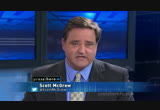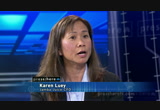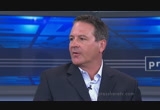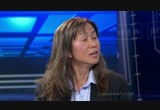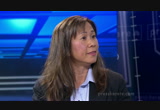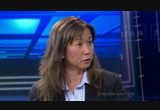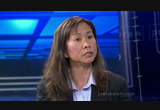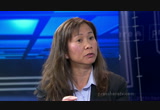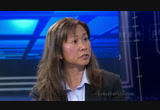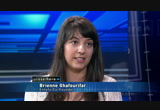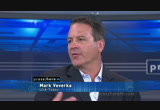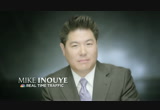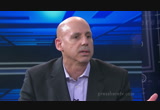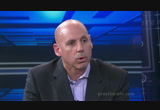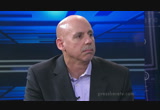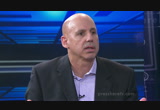tv Press Here NBC July 7, 2013 9:00am-9:31am PDT
9:00 am
this week, debate and discussion over wages. we meet an 18-year-old entrepreneur with a million dollars in funding and take a look at the state of venture capital. our reporters, rich from bloomberg, and mark of usa today this week on "press: here." good morning, everyone. i'm scott mcgrew. my first job in television was running the teleprompter, moving the words across a screen so an anchor could read them, for which i was paid $3.25 an hour. it was minimum wage at the time. now that i'm in front of the camera, i don't know how much our teleprompter operator makes, but i'm certain it's at least $10 an hour.
9:01 am
>> camera three next. ready, camera three, take three. >> that's because our studios are located in san jose, california, and voters here recently decided to raise minimum wage to $10. more than california's minimum $8, more than the federal government's minimum of $7.25. the debate over minimum wage is well known. businesses generally complain of higher costs, but a growing number of economists think a higher minimum wage can actually help. >> when you have a minimum wage increase, what happens is the workers stay longer than they otherwise would. >> what may surprise you most, though, is how few companies actually pay minimum wage. many, like the bay area based jamba juice, voluntarily pay many of their employees far more than the law requires.
9:02 am
most workers at jamba juice have no idea who karen louis is, but if they look closely, they'll see her name on the paycheck, the chief financial officer at jamba juice and her favorite flavor is banana berry. joined by rich and joe. in many markets, including in san jose, you don't pay minimum wage, you pay more, why is that? >> that's right, scott. just so you have some context about jamba, we're an 800-store global chain. >> south korea. >> south korea, moved to mexico this year, canada, as well as the philippines. but 60% of our system is franchised, so for the 40% that we control, the company-owned stores, we do look at market and competitive rates out there, so at the end of the day, it probably does equate to a little bit more or more than the minimum wage requirements in
9:03 am
counties and for the federal government, as well. >> you're essentially competing against, what, starbucks? >> we're competing against any qsr or anybody in the marketplace. >> qsr? >> quick-service restaurant. starbucks of the world, mcdonald's of the world. we're competing in local markets and local markets dictate what we'd like to pay for top talent. and key for us is doing things to attract top talent in each of those local markets. >> your product strikes me as being one that is high labor intensity to make. do you find your wages need to be higher to retain people because you do have to train more? >> mark, explain to somebody who's never been in a jamba juice high intensity. >> you make them individually, special orders sometimes, seems it's harder than working at a mcdonald's. >> you go from a bare orange to
9:04 am
juice. >> it is a custom made order. what they are also expecting from jamba, and that's why we look at retaining and attracting that individual is that energy. the first thing you feel is the greeting and energy and culture that's embedded in jamba juice. hey, mark, welcome to jamba juice, would you like your regular banana berry today? we're looking for the kind of people that can exhibit that enthusiasm. >> what's a little more, ten cents an hour, 20 cents an hour, and do you really get the quality worker that's enthusiastic? it's about culture for 20 cents more? >> you could get that. what we also find that's attractive to potential team members is the fact they can say, hey, guys, guess what, i work at jamba juice.
9:05 am
i can't tell how many times i've been at a convention, airport, and people come up and say, oh, my god, you work at jamba juice? i love jamba juice, and the people that say my child worked there. that was the first job that he had right out of high school, and that's what we like. we want the young kids out of high school pretty much going into college where if you look at the seasonal nature of jamba, we ramp up in the summertime and springtime, then in the fall when kids go back to school, it turns chillier, so we're able to ramp down the number of seasonal employees that we hire. so from that standpoint, it's the perfect job for somebody who is either going high school senior, senior in high school, or kids that are college students going to school. that's what we like. they are the ones that exhibit that enthusiasm and when their friends say, hey, hey, rich, where do you work? you're able to say i work at jamba juice and everybody says, wow, that's great.
9:06 am
that's what we're looking for. >> i know in a lot of quick service restaurants, mcdonald's and whatever, employee turnover can be a couple hundred percent a year. first of all, what is the turnover rate among your workforce at jamba and have you seen a difference giving the sluggishness of the economy, are people staying longer and more people trying to make a living off of working at jamba juice, rather than those saving for college? >> we look at those statistics pretty regularly. training new people, it can be very expensive, so we've looked at ways to attract and retain talent. one of the things that we've done a very good job at is we've got people who started as team members, frontline counter folks making the smoothies out in the line who have been able to work up through two paths, one is through the corporate office, and two is career passing through the field. a very good example is my
9:07 am
regional director of operations in southern california. he started 11 years ago as a team member and now he's running over 100 store locations in socal. we've got examples of -- you guys are going to laugh, but team members who met at jamba, married, had families, and now one of them is running our international operations for one or two countries, the other one is the senior manager in our h.r. group in charge of training and development. there are ways that we found we can attract the people, keep them employed at jamba and show them a career path so they can feel part of the family and grow within the jamba environment. >> you have a reasonably new ceo who's brought in a number of changes to try to change the direction of the stores. you're losing money, and as a dad who buys the $4 jamba juice, where is that money getting
9:08 am
lost? you're in charge of the money. where is the money leaking out. where can you plug the hole and say this is our problem right here? >> step back a little bit, scott, we were profitable last year in 2012 for the first time since we've been public. the prior three years from that we have been working around a turnaround situation. this year, 2013, we're projecting to be, you know, some pretty incredible growth for us from the standpoint of our core business that you all are familiar with. in addition, though, to a couple of large growth initiatives we have, growing our international business, as well as growing something called our jamba go segment, which is targeting schools to introduce kids at a younger age at jamba and it's a healthier alternative than some things public schools have today. >> we're running low on time, but back to the question of, are you selling it for less than it costs to make it, where is the
9:09 am
money -- too many people in the store that you have to pay? do you know where it is that you say, you know what, if we're going to turn things around, this is where we need to fix it? >> a couple of things we've been working on, one is the topline growth. we've had same store sales increase the last two years, so continuing on that trajectory will help. the other thing is we have been able to take hundreds of base points out of the cost structure. >> what did you cut? >> using technology a little bit better so we could deploy labor more efficiently in the stores. we've looked at using technology in other store operating activities that we do at the store, and we've also taking about 35% out of what we call administrative line in order to bolster our bottom line. if you wrap that all in a package and look at what we're looking at for 2013, that is our year of profitability. >> what is your average ticket for customer compared to other quick-service restaurants?
9:10 am
>> it's very similar to something you would expect at a quick service like a starbucks or coffee shop restaurant. >> you've never disclosed that figure? >> we haven't. auvs, average unit sales, is about $700,000, $750,000. >> we're going to let rich throw in the last question. >> since i work for a guy who's somewhat famously gone after ultra large sized soft drinks, i'm surprised the calorie count of some of the smoothies. is there anything you can do or are doing to try and make that a little bit less impactful on the waistline as opposed to the bottom line? >> thank you for asking that question, rich. we have. we've introduced a lineup of awesome smoothies that are more habitual to the customers. >> would those be the things you
9:11 am
want to push in schools as opposed to the 500-calorie megablast? >> you're absolutely right. we have to adhere to the school nutritional guidelines, so anything that we put in the schools have to adhere to those particular guidelines. fruit and veggies would absolutely adhere to that. also we have a make it light platform so you can get your creamy treats with one-third less calorie, carb, and sugar. >> that's the time we have. i assume the orange dream is still really low-cal, though? karen luey wi, thanks for being with us. up next, "press: here" continues.
9:13 am
here." lots of parents have a bumper sticker that says my child was student of the month. there is not a sticker that says my child graduated college at 17, then launched a silicon valley company and raised more than a million in venture capital, but brianne did just that. her company is called entify. technically her parents would need two bumper stickers because her brother did the exact same thing. the pair run the company together. congratulations on being an 18-year-old with a startup. the first question, though, where did the money come from? this is not your dad giving you a million dollars. >> no, definitely not. fundraising is hard. you always have to start somewhere. typically, it's friends, family, community. for us we did the exact same thing. it started just like that and when we started speaking about what we were doing to people, people wanted to help. we'd surround ourselves with people that could help us out and start with one investor and
9:14 am
it kind of spurs off from there and early on in our team we had a network, as well, so that could help us out in everything. we're very grateful to have an incredible group of angels. >> how many investors do you have and who helped you with the capital formation and going out, did they get stock, did they get debt, what did you give them in exchange? >> convertible notes. some in business, some in tech, some in health care, some in film. very diverse group. i think what that speaks to is the quality of the product and i think it really resinates with people from diverse backgrounds. >> what is the products? >> building a single application that brings together all of your different mediums of communication, so think about all your e-mails, texts, voice, video, social. >> unified inbox? >> a little like that by concept, but really the true promise of what that can bring. >> ios? >> across all devices. that's the differentiator for
9:15 am
us, but bringing everything in one place creating a simplified way of communicating with people. the way it is now, we use several different applications, some of the different devices we have don't speak to one another and there's chaos in the market right now. what we're doing is bringing everything together in a simple, convenient way for consumers. >> your company has some employees and you've been out raising money. how did you manage to get yourself taken seriously as you were raising money and do the people who work at the company have any issue in taking orders from an 18 year old? >> that's a really good question. i think as a general rule people didn't look at us as being young. my brother just turned 21, i just turned 18. >> we still look at you as young. >> we are young but we have a passion for what we're doing and spend time being committed to learning new things. we knew early on we didn't have the answers so we surrounded ourselves with people who can help us learn.
9:16 am
>> let me ask rich's question in diverse, it does well and you sell it, or it doesn't do well, and you go work at google and now you are not in charge. most of the time when you're 18, 19 years old, you don't get to be in charge of the company, right? will you be able to handle that side of it? >> well, absolutely. what's most important is what you're bringing to the table. that's what it's all about, being a good team player. i have a certain amount of core values and way in which i do things and i'll take that with me and apply it to whatever position i'm in in the future. >> your product may be a good idea or not, we'll find out, but how did you go about acquiring the people to develop the technology behind it? you and your brother came up with this idea, sounds like a good idea, but then you have to develop the product. how did you go about that? >> that was one of the challenges. austin and i don't have
9:17 am
engineering backgrounds, so we surrounded ourselves with people who did. >> how did you go about that? >> we have a couple of external tech partners who are also investors in our company, and we're building our internal engineering team. we have our new product director, he's great, fantastic, he's built award winning social games and he's building the internal team for us. >> you hired outside the company. you outsourced the engineering? >> we have offshore engineering partners. we have offshore engineering partners, but all the creation of the product and design is done in-house. >> did you think about raising money through kick start or crowd source fund something. >> it's something we definitely thought about. what happened is we ended up meeting with people and people got so excited they wanted to help and it grew very quickly, very fast. >> you didn't need the general public? >> i think that's what was really incredible. this product really resinates
9:18 am
with people from different backgrounds and that's something we're grateful for. >> i'm going to ask the question you get asked all the time, it's going to be hard to answer because you only have your own reality to know. how does someone go to college at 14, how does someone raise a million dollars at 17, and you did it at 17, you're now 18, so people know why we're using two ages. how do you do that? >> i think there's definitely no formula and it takes a lot of motivation and drive. when i was in middle school, my family came across an opportunity where i could accelerate my education, so i worked very hard for a couple of years and ended up finishing early. i went to santa clara university, which was the best school i could have gone to. you're going to college at 14, you really need that support system and mentorship around you and santa clara did a fantastic job providing that for me and my family is supportive and i was driven to what i was looking for. i finished my education early and toward the end, entify came
9:19 am
around. >> i've got to stop you there. brianne, i have no doubt whatsoever you're going to be on this show many times until such point we can't get you anymore. >> thank you. i'll always come back. always. >> thank you for being with us. >> thank you so much for having me. technically my next guest is supposed to be the expert in venture capital. the state on sand hill road when "press: here" continues.
9:20 am
welcome back to "press: here." silicon valley, the center of technology for many reasons, but one of the primary reasons we'll call the willie sutton rule. silicon valley is where the money is. nowhere else in the world do you see the concentration of venture capital. more money invested in three california counties than the
9:21 am
entire gdp of north korea. jeff graybo is the west coast venture capital leader. i assure you, he's very knowledgeable, despite the fact he didn't raise a million dollars before he was 18, which is why i said before the commercial, technically the expert. thanks for being with us. what is the state of silicon valley and venture capital? it seems they are getting a big payoff lately with instagram, a big ipo last week, the name escapes me, it looks pretty good. >> a healthy environment for exits benefits venture capital. money is raised in a venture fund, deployed into start-up companies and hopefully there's a exit at the back end which recycles the money back in. >> come out with more than you had when you started. >> exactly. >> and that status is good, it's paying off for them? >> yeah, like i said, the market is high right now, so that's
9:22 am
creating a good opportunity for companies to get into the pipeline. >> a lot of the exits have been through acquisition, tumblr, instagram and so forth, but people are wondering when and if the ipo window is going to open up again in a big way and will it soon and what does that mean for a twitter ipo down the road? >> one of the things that we did, venture capital has evolved. it's 50 years old, over 50 years old. we've been working for over 50 years, and we did some research and found interesting things. as it results to acquisitions, we took a look at the role of corporate venture capital in inside venture capital, and we found a couple very interesting things and one is that if you take corporate venture capital, it doesn't necessarily mean that corporation is going to acquire you. in reality, 2% of the time -- >> corporate venture capital, we have a peacock ventures.
9:23 am
google ventures, exactly. >> and so only about 2% of the time. that was very surprising to me. i would have expected the role was to place a lot of bets almost as a put option to have a right at first refusal, but what we found is as companies get bigger, it's more difficult to innovate and what they are using is an opportunity to put money into companies, have an opportunity to get a look inside at what's going on, figure out ways to get synergies on their existing platforms and perhaps make some money. >> has the nature of venture capital changed with the rise of angel investing, with the rise of crowd sourced investing like kick starter? has the basic nature changed? >> that played another interesting myth that we found, in that is it's all about early stage companies. the reality is, angel capital starts companies, venture capital helps them scale.
9:24 am
there's a very healthy angel environment. earlier you talked about kick starter. i myself have done a kick starter program. >> which one? >> my wife's cousin did a book down in southern california and it was a nonprofit, so we put money behind that and we have the copy of our book right now. the angel environment is very robust, and so it's easier to start a company, you know, with angel capital and the right rooms in silicon valley, it's easy to raise the money. in addition, the cost of starting technology companies has dramatically decreased over the years. >> i am surprised, even with our previous guests, raised over a million, they are creating a one program. what are you doing with a million dollars. that lean startup, we started with lean startups, apple started in a garage with a couple guys that could barely afford the chips, are we moving back toward that, you can start lean with some angel money? >> yes. that gets back to the idea
9:25 am
venture capital helps these companies scale, to grow, exit capabilities, but when you take a look at what's required to start companies, a lot of the technologies deployed over the last ten years now have been deployed into kind of the company creation phase and can be bought on a per-drink, per transaction basis that can drive down the costs so you don't need to go out and buy what you used to need to buy. >> venture capital hasn't moved much. you'd think with the easy transfer of money in a modern world it would be so fluid, but it's still in silicon valley. we have ten times the investment here that texas does, five times as much as new york city. it stays here. they are based here and they stay here. >> well, the interesting thing about that is everyone looks at silicon valley and takes a look at what it is today. as i mentioned before, it's 50 years old. it's taken 50 years to get to where we are today. i've talked to people around the world who want to create their
9:26 am
own silicon valley. while you can shorten the process, there are basic things that need to be in place and you can't make those happen overnight. >> what are those things? >> education. >> stanford. >> access to capital. >> sand hill road. >> robust ecosystem of providers. >> a lot of interest firms insist their companies move to california in order to take their money. they want to take advantage of that ecosystem. >> we've simply run out of time. jeff, thank you for being with us this morning, in charge of venture capital. >> thank you for having me. >> "press: here" will be back in just a moment.
9:27 am
9:30 am
hello and welcome to "comunidad del valle." i'm damian trujillo. and today we're going to spend the entire half hour learning how our schools might be failing our children. this is our "comunidad del valle." welcome back to "comunidad del valle." the report is called "broken promises," and it explains some of the problems and some successes in our schools in san mateo and santa clara county. with me is matt hammer and he brought along a parent, elizabeth alvarez. welcome to the show. >> thank you. >> matt, tell me about this report. let me first bring up the graphics that we
82 Views
IN COLLECTIONS
KNTV (NBC) Television Archive
Television Archive  Television Archive News Search Service
Television Archive News Search Service 
Uploaded by TV Archive on

 Live Music Archive
Live Music Archive Librivox Free Audio
Librivox Free Audio Metropolitan Museum
Metropolitan Museum Cleveland Museum of Art
Cleveland Museum of Art Internet Arcade
Internet Arcade Console Living Room
Console Living Room Books to Borrow
Books to Borrow Open Library
Open Library TV News
TV News Understanding 9/11
Understanding 9/11
